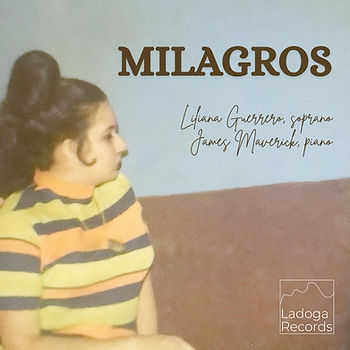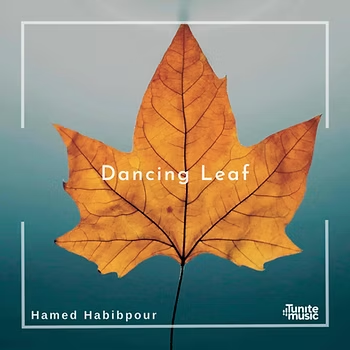
Milagros by soprano Liliana Guerrero and pianist James Maverick is a remarkable 13-track album that brings together the music of Latin American women composers, published by Patricia Caicedo and Mundo Arts. Featuring works by Ernestina Lecuona, Yvette Souviron, Mariela Rodríguez, and a world premiere commission by Edna Alejandra Longoria-Valdez, the album stands as a significant contribution to the rediscovery and celebration of voices that have too often been overlooked in the classical canon. At once scholarly and deeply emotional, Milagros highlights not only the artistry of the composers but also the extraordinary interpretative skills of Guerrero and Maverick.
The voice of Liliana Guerrero is both tender and powerful. She enunciates every syllable with clarity while preserving a natural melodic flow, blending technical precision with expressive depth. Her mastery of vocal control allows her to handle dynamic shifts with ease, navigating soaring high notes and intimate pianissimos alike. The subtle vibrato on sustained notes gives her interpretations a rare depth, infusing each song with a sincerity that feels personal and immediate. Guerrero does not merely sing the notes; she inhabits the text, making every phrase resonate with emotional weight.
On the piano, James Maverick demonstrates the same high level of artistry. Far from being a mere accompanist, he becomes an equal partner in the music. Many of the composers, such as Yvette Souviron and Mariela Rodríguez, crafted piano parts that are integral to the structure of the songs, offering counter-melodies, harmonic colors, and rhythmic vitality. Maverick handles these demands with elegance and sensitivity. In Souviron’s “Tango argentino”, while Guerrero sustains a soaring line of long notes, Maverick provides a luminous emotional counterweight through soft yet insistent melodic and chordal textures. Similarly, in Souviron’s “Gaucho mensajero”, the piano opens with bold chord progressions that establish the song’s dramatic trajectory before yielding to moments of lyrical intimacy.
The variety of styles across the album showcases the duo’s versatility. In Ernestina Lecuona’s “Vidala”, Guerrero’s singing takes on the quality of a heartfelt ballad, while “Habanera” by Souviron swings with a graceful, dance-like energy. Rodríguez’s “Tres poemas negros” brings playful contrasts, from the lively staccatos of “Pregón” to the haunting lyricism of “Poema de la jícara” and “Para dormir a un negrito.” The cycle is a highlight of the album, bridging Afro-Caribbean influences with an art song sensibility. Finally, the world premiere of Edna Alejandra Longoria-Valdez’s “Duérmete mi niña” provides a fresh and tender close to the program, reimagining a traditional lullaby with a contemporary harmonic language that Guerrero delivers with warmth and intimacy.
As a whole, Milagros is more than a recital, it is a cultural statement. The album affirms the place of Latin American women composers in the broader landscape of classical music, while also demonstrating how richly diverse their contributions are, from tango-inspired rhythms to folkloric ballads and Afro-Latin texts. Guerrero and Maverick’s performances bring out the individuality of each composer while maintaining a cohesive musical journey. Their chemistry is evident: voice and piano breathe together, each shaping the other’s phrases in an organic dialogue.
The excellence of the album is no surprise given the background of the performers. Guerrero, a soprano with a wide-ranging career across the United States, is known for her versatility, from the fiery Frasquita in Carmen to the ethereal lines of Brahms’ Requiem and the demanding coloratura of Cunegonde in Candide. Her experience with both opera and concert repertoire gives her the stylistic flexibility needed for Milagros, where each piece demands a unique vocal color and interpretative approach. Maverick, equally distinguished, brings a wealth of experience as pianist, conductor, and chorus master with companies such as Cincinnati Opera, Austin Opera, and the Lyric Opera of Kansas City. His collaborations with contemporary operas and new works make him particularly adept at interpreting the innovative writing of composers like Rodríguez and Longoria-Valdez.
In the end, Milagros succeeds not only as a beautifully performed album but also as a vital artistic project. It shines a spotlight on underrepresented voices while offering listeners a deeply moving musical experience. Guerrero and Maverick prove themselves not just as skilled interpreters but as passionate advocates for this repertoire. This is an album that deserves attention from anyone interested in Latin American music, art song, or the evolving role of women composers in the classical tradition.
#MilagrosAlbum #LatinAmericanMusic #WomenComposers #ArtSong #LilianaGuerrero #JamesMaverick #ClassicalMusic #VocalMusic #PianoAndVoice #LatinAmericanCulture #OperaSinger #SopranoVoice #AlbumReview #ClassicalVocal #MundoArts
This review was written as part of a promotional service provided by Tunitemusic, based on information submitted by the artist.







